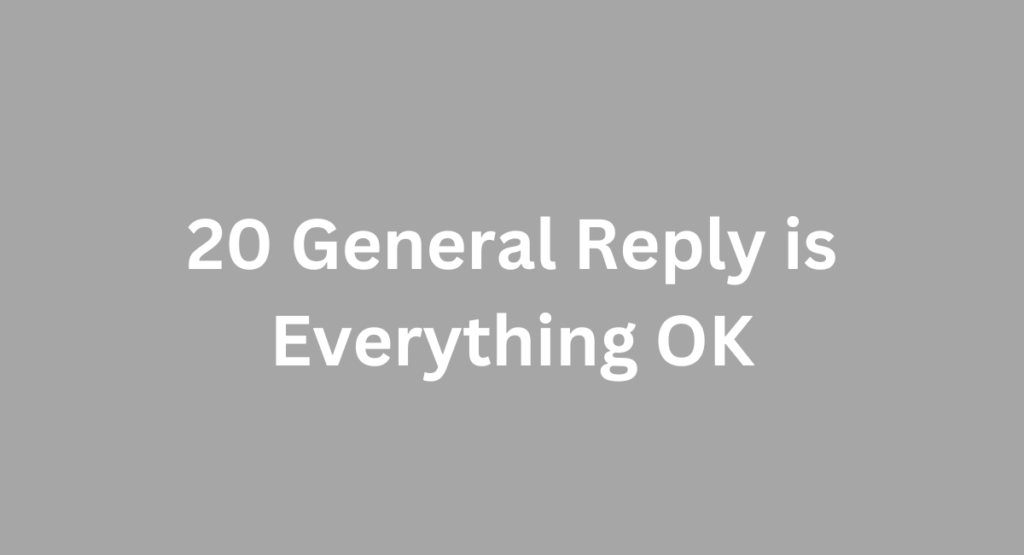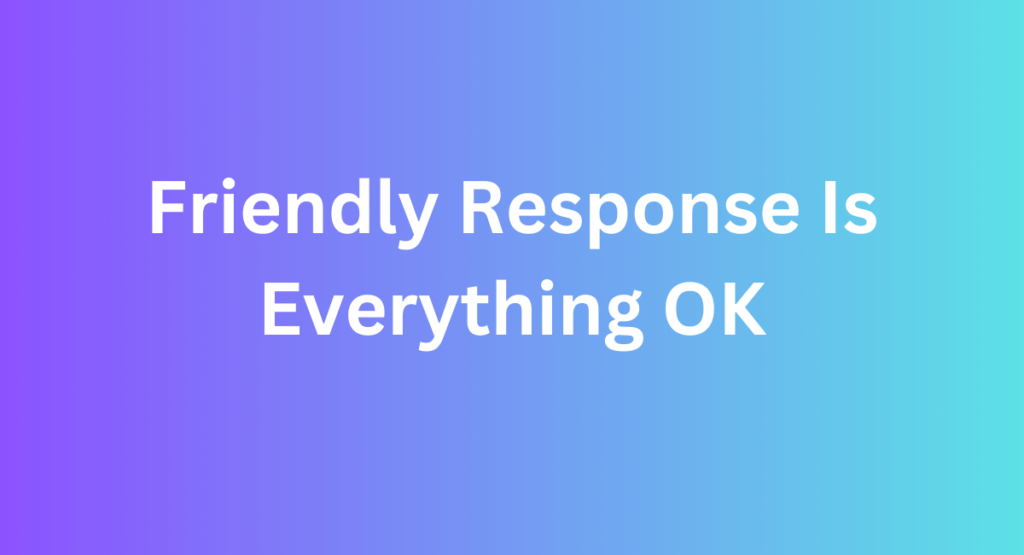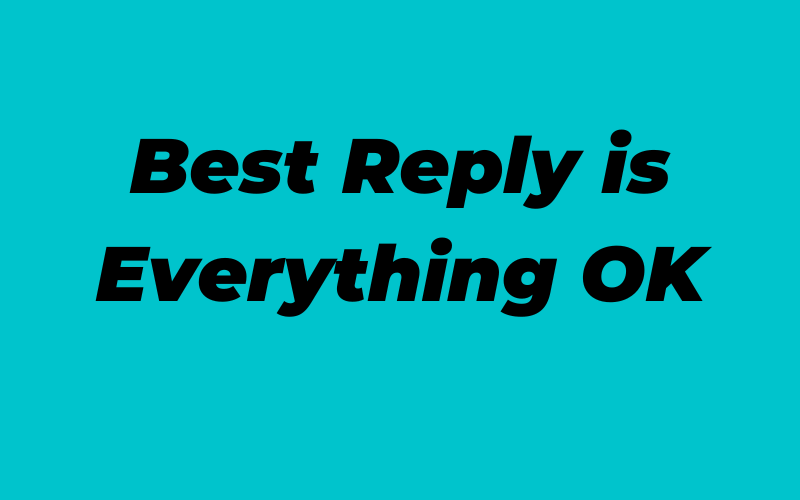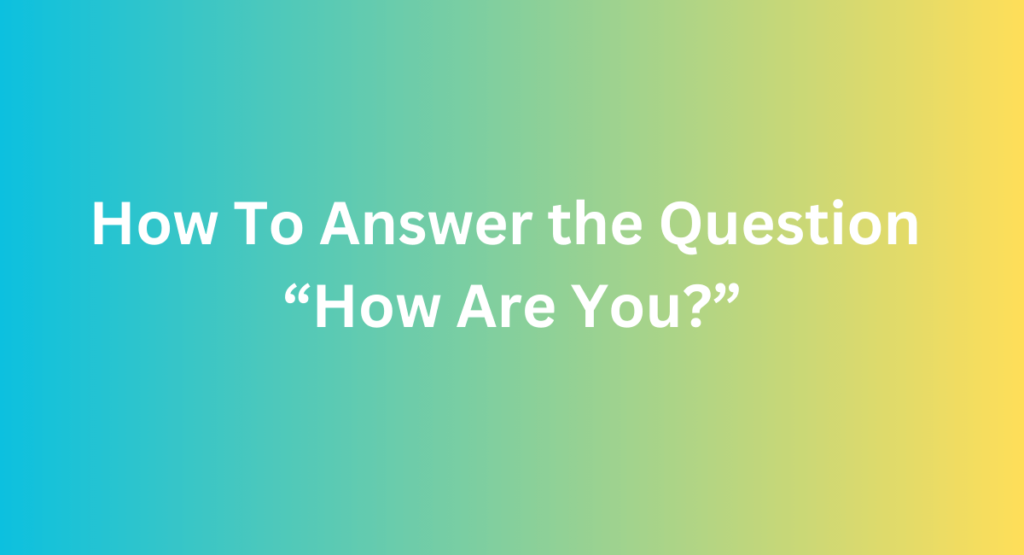Everything is okay, thank you! When someone asks if everything is okay, it’s important to respond genuinely and gratefully.
Expressing appreciation for their concern and acknowledging any current struggles can help foster open communication and support. Responding with phrases such as, “I appreciate you asking; thank you. I’ve been feeling a bit down lately, but I’m trying to work through it,” can convey gratitude while also being honest about how you’re feeling.
Remember, people ask because they care, so being open and transparent can lead to meaningful conversations and connections.
20 General Reply is Everything OK

The response to “Is everything okay?” is a crucial element in communication, reflecting the individual’s well-being and the tone of the conversation. Polite responses often express gratitude for the inquiry and reassure the person that everything is fine. Casual responses infuse humor or simplicity into the exchange, creating a relaxed atmosphere. Friendly responses go a step further, expressing appreciation for the concern and often using upbeat language to convey a positive outlook. The choice of response contributes to shaping the overall tone of the conversation, emphasizing courtesy, warmth, or familiarity, depending on the context and relationship between the individuals involved.
- Yes, everything is great. Thanks for asking!
- Everything is fine on my end. How about you?
- No worries, everything is okay. Thanks for checking in.
- All is well, appreciate your concern!
- Thanks for asking, everything is going smoothly.
- Yes, everything is alright. How about you?
- Everything is in order. Thanks!
- No problems here, everything is OK.
- Everything is just fine, thanks for reaching out!
- Yes, everything is good. I appreciate your care.
- I’m doing well, thanks. Everything is okay.
- All is well on my side, thanks for checking on me.
- Thanks for your concern, but everything is fine.
- Yes, everything is okay. I appreciate your thoughtful inquiry.
- Everything is going well, thanks for asking!
- No issues here, everything is okay.
- I’m good, and everything is alright. Thanks for asking!
- Appreciate your concern, but everything is fine.
- Yes, everything is in order. Thanks for your attention.
- All is well, thanks for checking up on me.
Casual Reply Is Everything OK

The question “Is everything okay?” often prompts casual responses that convey a sense of ease and reassurance. In these casual replies, individuals use informal language to affirm that all is well, acknowledging the typical ups and downs of life. The tone is light-hearted, creating an atmosphere of familiarity and comfort. Casual responses to this question aim to assure the inquirer that, despite the complexities of daily life, there are no major concerns or issues to be alarmed about. These responses are designed to maintain a relaxed and friendly conversation.
1. “All good in the neighborhood, thanks for asking!”
2. “Yep, everything’s peachy keen. How about you?”
3. “Smooth sailing on this end, no worries!”
4. “A-okay! Just the usual chaos, you know.”
5. “Surviving the day, so I’d say it’s alright.”
6. “Everything’s cool, just juggling the usual madness.”
7. “Oh, you know, the usual rollercoaster of life, but I’m hanging in there.”
8. “All good on this side of the fence. How about yours?”
9. “Yeah, everything’s fine. Just the usual pandemonium.”
10. “No major disasters yet! So, yeah, everything’s okay.”
Polite Response Is Everything OK
Polite responses to the question “Is everything okay?” aim to acknowledge the inquiry with gratitude while reassuring the person that there are no major concerns. These responses convey a sense of appreciation for the inquiry and offer reassurance that everything is in order. The tone is respectful and considerate, creating a positive and comforting atmosphere in the conversation. Polite responses not only address the immediate question but also express acknowledgment and gratitude for the genuine concern shown by the person asking.
1. “Thank you for asking, everything is fine on my end.”
2. “Yes, everything is okay. I appreciate your concern.”
3. “I’m doing well, thank you. How about you?”
4. “Everything is good, I assure you. Your thoughtfulness means a lot.”
5. “I appreciate your concern; everything is perfectly fine.”
6. “Yes, everything is okay. Your consideration is much appreciated.”
7. “Thank you for checking in. All is well, and I hope the same for you.”
8. “I’m doing fine, thanks for asking. How are things on your side?”
9. “I’m doing well, and I genuinely appreciate your care and concern.”
10. “Everything is alright, and I’m grateful for your thoughtful inquiry.”
Friendly Response Is Everything OK
Friendly responses to the question “Is everything okay?” convey a positive and appreciative tone. These replies express gratitude for the inquiry, assuring the person that all is well while using cheerful and upbeat language. The aim is to create a warm and inviting atmosphere in the conversation, emphasizing the positive aspects of the respondent’s current situation. Friendly responses not only address the initial question but also reflect a genuine connection, as the person appreciates the care and thoughtfulness of the one asking. These interactions contribute to fostering a positive and supportive communication environment.
1. “Hey, thanks for asking! Everything’s fabulous on my end.”
2. “I appreciate your concern! Yep, everything is more than okay, it’s fantastic!”
3. “You’re sweet to check in! All good here, just riding the waves of life.”
4. “Thanks for caring! Everything’s A-OK, and I’m loving every moment.”
5. “Hey friend! Everything is more than okay – it’s sunshine and rainbows over here!”
6. “I’m touched you’re thinking of me! Everything’s fantastic, couldn’t be better.”
7. “You’re the best for asking! Everything’s great, just enjoying the journey.”
8. “Thanks for your kindness! Everything’s wonderful, and I’m feeling grateful.”
9. “Your concern warms my heart! Everything is splendid, thank you!”
10. “You’re a star for checking on me! Everything’s fantastic – life’s treating me well.”
Tips For Crafting A Reassuring Response

When someone asks if everything is okay, it’s important to respond reassuringly and genuinely. Your response can help alleviate their concerns and provide comfort and support. Here are some tips for crafting a reassuring response:
Expressing Gratitude
Start your response by expressing gratitude for their concern. Let them know that you appreciate them reaching out and that their care means a lot to you. For example, you can say something like:
“I appreciate you asking; thank you for reaching out. It means a lot to me that you care.”
Being Honest And Transparent
It’s important to be honest and transparent in your response. If you’re going through a difficult time or feeling down, it’s okay to share that with them. However, make sure to reassure them that you’re working on it and trying to overcome it. For example:
“I’ve been feeling a bit down lately, but I’m trying to work through it. Your support means a lot to me.”
Offering Support And Understanding
Show them that you’re there for them as well. Offer your support and let them know that you are available to talk or listen if they ever need someone. This can help create a sense of mutual understanding and strengthen your relationship. For example:
“I’m here for you too. If you ever need to talk or if there’s anything I can do to support you, please don’t hesitate to reach out.”
Providing Reassurance And Encouragement
Provide reassurance and encouragement in your response. Let them know that they are not alone and that things will get better. Offer words of encouragement and remind them of their strengths and capabilities. For example:
“I want you to know that you’re not alone in this. I truly believe that you have the strength to overcome any challenges you’re facing. Keep pushing forward, and things will start looking up.”
Setting Boundaries And Self-care
Lastly, it’s important to set boundaries and prioritize your self-care. If you’re going through a tough time, let them know that you may need some space or time to yourself. Taking care of your well-being is crucial, and by setting boundaries, you show others that it’s okay to do the same. For example:
“While I appreciate your concern, I’m currently focusing on self-care and taking some time for myself. I hope you understand.”
By following these tips, you can craft a reassuring response that shows your gratitude, honesty, and support while also prioritizing your well-being. Remember, the best reply is one that comes from the heart and shows genuine care and understanding.
Frequently Asked Questions On Best Reply Is Everything OK
How Do You Respond When Someone Asks If Everything Is OK?
“Yes, everything is just fine. Thank you for asking. “
How Do You Respond To How Is Everything?
I appreciate you asking, thank you. I’m feeling a bit down lately, but I’m working through it.
What Is A Good Response To Are You OK?
When someone asks if you’re okay, a good response can be, “I’m doing my best, thank you for asking. ” Express appreciation and reassure them that you’re trying your best.
How Do You Respond To Ok In A Text?
Respond with a positive acknowledgment like “Great, thanks!” Or seek clarification by asking “Could you please explain more? ” You can also agree with “I agree, OK,” or show understanding with “I understand, OK. ” Alternatively, respond with your agreement or approval with “OK, I’m on board.
“
Conclusion
When someone asks if everything is okay, it’s important to respond honestly and appreciatively. Express gratitude for their concern and let them know you’re working through any challenges. A response like, “I appreciate you asking; thank you. I’ve been feeling a bit down lately, but I’m trying to work through it,” acknowledges their care and shows that you’re open to sharing your feelings.
Remember, people generally ask because they genuinely care about your well-being. So, be open and honest in your response.





